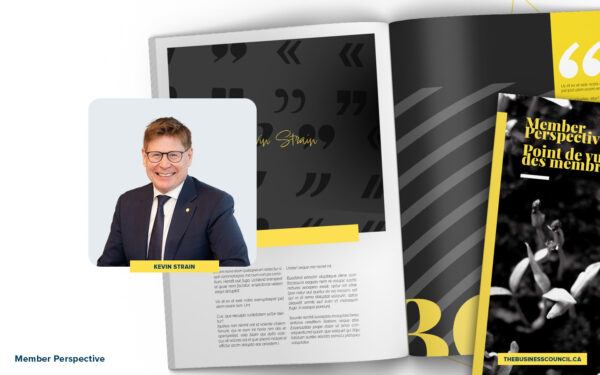Better aligning Canada’s immigration system
Letter to The Honorable Marc Miller, M.P., P.C., Minister of Immigration, Refugees and Citizenship regarding the upcoming Immigration levels Plan.
Re: Immigration Levels Plan 2024-2026
Dear Minister Miller,
As the Government of Canada considers its next Immigration Levels Plan, the Business Council of Canada urges you to use this opportunity to better align Canada’s immigration system with the country’s economic needs by giving greater preference to highly skilled economic class immigrants who can immediately fill high-paying jobs.
Under the current plan, 60 per cent of total admissions are expected to fall under an economic class program by 2025. While we welcomed the Government’s increased focus on economic migration last year, we continue to believe that bolder targets for highly skilled economic class admissions are required.
Enhanced economic immigration is essential to ensuring Canada remains one of the world’s most advanced and dynamic economies.
Indeed, despite job vacancies declining from record highs in 2022, a staggering 843,200 job openings remain unfilled across all sectors of the Canadian economy. And while the number of vacancies requiring lower levels of skill and education has declined significantly, unfilled job openings for highly trained and educated professionals remain stubbornly high.
If not addressed with urgency and ambition, this shortage of leading talent will have a large and lasting impact on Canadian technological innovation, labour productivity, and capital investment. The result will be fewer economic opportunities, lower real wages, and a diminished standard of living for generations of Canadians.
In a 2022 survey of Canada’s most innovative and successful businesses, 80 per cent of respondents reported having difficulty finding the highly skilled and accomplished workers they need to innovate, grow, and compete internationally. As a result, 67 per cent of surveyed businesses canceled or delayed major investments, 30 per cent were forced to relocate business operations outside of Canada, and 26 per cent lost global market share.
To enlist more of the world’s best and brightest to build the next wave of Canadian products and businesses, we urge that, by 2025, 65 per cent of total permanent residents entering the country do so under an economic class program.
If we do not seek this skilled labour, our economic rivals will. Peer nations, who compete aggressively with Canada for top international talent, regularly admit higher proportions of economic migrants than Canada. For instance, under Australia’s 2023-2024 Permanent Migration Planning Levels, 72 per cent of permanent residents are expected to enter that country under its economic stream.
As equally important to raising economic class targets, we urge that the Government prioritize the recruitment of highly skilled and accomplished professionals, especially in the fields of science, technology, engineering, and mathematics.
By turning new ideas into innovative products and thriving businesses, highly skilled newcomers have been an engine of economic growth. The expertise they bring is also essential to helping solve pressing social challenges, such as long waits in emergency rooms, transportation delays, and a lack of affordable housing.
To attract this talent, we recommend that the Government expand its existing expedited entry systems for highly skilled talent, such as the Global Talent Stream, while creating new and more streamlined pathways to permanent residency for high-potential newcomers with temporary status, such as international students with advanced degrees. In our view, a growing workforce must also be accompanied by increased investments in essential services, affordable housing, and public infrastructure.
Canada’s business leaders are ready to support increased economic migration. They are prepared to offer new workers settlement services, including language and cultural training; assistance in obtaining recognition of their foreign credentials; as well as provide relocation supports, such as temporary housing, interest-free loans, and tax advice.
Minister, on behalf of business leaders in all sectors and regions of our country, thank you for the opportunity to contribute to the Government’s next Immigration Levels Plan.
Sincerely,

Goldy Hyder
c.c. The Honourable Chrystia Freeland, P.C., M.P.
Deputy Prime Minister and Minister of Finance
Mr. Paul Chiang
Parliamentary Secretary to the Minister of Immigration, Refugees and Citizenship
Mr. Chris Forbes
Deputy Minister, Department of Finance
Ms. Christiane Fox
Deputy Minister, Immigration, Refugees and Citizenship Canada










